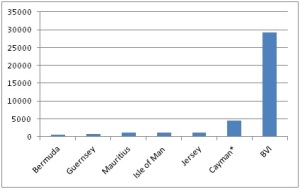Jason Sharman is a respected academic who has written about money-laundering and shell companies for the World Bank and is regularly cited as an expert. One of his most well-known findings is that it is easier to open an anonymous shell company in OECD countries, in particular the US and the UK, than in offshore secrecy jurisdictions such as Cayman.
Which is why it is rather confusing and disappointing to find this paper by Sharman from 2010 and its accompanying press release. The press release says that “International Financial Centres can boost growth in developing countries”. The paper concludes “…the evidence presented in this paper suggests that there is much to be gained by developing countries cultivating closer relations with IFCs to foster growth and reduce poverty”.
The proposed link between International Financial Centres (IFCs) and development is via the “sophisticated, robust and efficient institutions” in IFCs. Using China as an example, the argument is that “Chinese firms as well as foreign investors form links with IFCs to capitalise on the efficient, transacting-cost-reducing institutions IFCs host.”
So the fact that the British Virgin Islands, for example, is one of the top ten Foreign Direct Investment sources into China is not really due to round-tripping, corruption or tax evasion but to investors taking advantage of BVI’s strong institutions to compensate for Chinese weak institutions.
There are several other things which seem odd about the paper, but I’ll just mention a couple before moving to the really worrying part. For very useful guides to counter the “tax havens are good” narrative please see the Tax Justice Network here and the Treasure Islands blog here.
If the claim is that IFCs help developing countries by enabling investment inflows which would not happen otherwise – for example the 41 billion USD invested into China from BVI in 2008 – shouldn’t these inflows at least be netted against the the illicit financial outflows developing countries lose? Global Financial Integrity estimates that 2.8 trillion USD flowed illicitly out of China from 2005-2011,out of which USD 595 billion ended up in tax havens. And wouldn’t it also be worth looking at who benefits from doing business with IFCs (mostly rich elites and multinational corporations) and who usually loses (the general population that relies on state health, education and infrastructure)?
The most worrying thing about the paper, though, is not the content but the fact that is that it was jointly commissioned by the Commonwealth Secretariat and the IFC Forum. The IFC Forum is an offshore lobby group composed of “law and accounting firms headquartered in Bermuda, the British Virgin Islands, the Cayman Islands, Guernsey, Jersey and Mauritius” including practically all the members of the offshore Magic Circle. Its secretariat at the time was a London PR firm.
The press release for the paper includes this:
“Sharman also finds that there is insufficient evidence to support the two common misconceptions surrounding IFCs; that they drain wealth from developing countries or that they are used for tax avoidance. In fact, the report finds that small IFCs are crucial intermediaries for trade with and investment into developing countries.”
The point is not to bash Jason Sharman here. But I can find no evidence of any direct challenges to his “IFCs are good for development” claim, and the paper seems to have gone largely unnoticed. In the meantime, Sharman’s findings on money-laundering have definitely been picked up by Cayman’s government and media with headlines such as “Cayman’s perfect compliance record“.
At the very least, it seemed worth mentioning.
